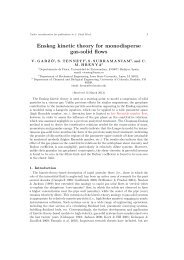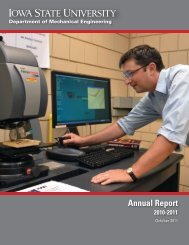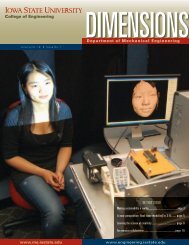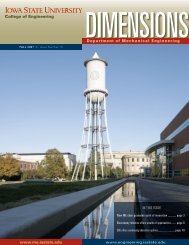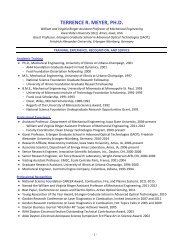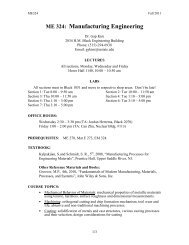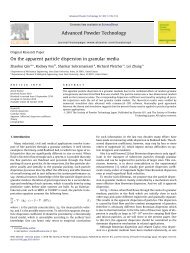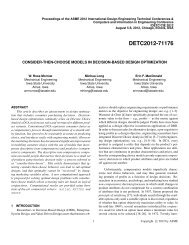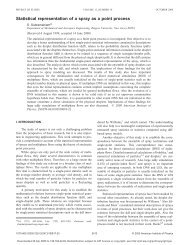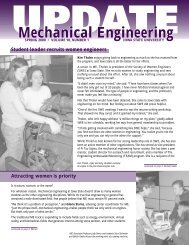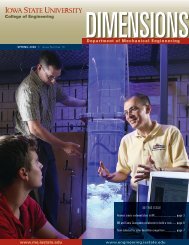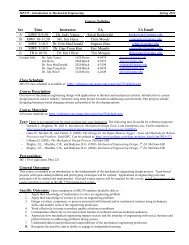Handbook - Mechanical Engineering - Iowa State University
Handbook - Mechanical Engineering - Iowa State University
Handbook - Mechanical Engineering - Iowa State University
Create successful ePaper yourself
Turn your PDF publications into a flip-book with our unique Google optimized e-Paper software.
Heat Transfer: ME 441, ME 442, ME 475, ME 530, ME 536<br />
Machines and Systems: ME 417, ME 425, ME 475, ME 515, ME 516, ME 518, EM 425<br />
Materials and Manufacturing Processes: ME 418, ME 466, ME 520, ME 521, ME 522, ME 528, EM<br />
362, EM 362L, IE 361, IE 419, IE 439<br />
Mechatronics and Robotics: ME 410, ME 411, ME 418, ME 511, EM 425<br />
Thermodynamics and Energy Utilization: ME 433, ME 442, ME 443, ME 444, ME 446, ME 451, ME<br />
475, ME 530, Nuc E 401<br />
<strong>Engineering</strong> Business and Marketing: ME 412, ME 484, Con E 380, IE 305, MIS 330, OSCM 320<br />
Also, students may access the Career Focus link below for additional information about areas of interest<br />
www.me.iastate.edu/academics/advising-resources/career-focus.html.<br />
Graduate Study in Other <strong>Engineering</strong> Fields: It is not uncommon for students to obtain graduate<br />
degrees in fields different from their undergraduate degrees. <strong>Mechanical</strong> engineering undergraduate<br />
students interested in obtaining advanced degrees in a discipline other than mechanical engineering<br />
should contact the department responsible for the degree of interest. Careful planning in the junior and<br />
senior years will reduce the possibilities of having to make up any deficiencies while in graduate school.<br />
Business School: Many engineers earn a Masters of Business Administration (MBA) after first earning<br />
their baccalaureate degree. The combination of an engineering degree and an MBA provides excellent<br />
preparation for those individuals wishing to practice as private consultants.<br />
Most MBA programs have no specific requirements and accept students with a variety of undergraduate<br />
backgrounds. Students interested in an MBA are encouraged to take Econ 101 and Econ 102, (one or the<br />
other of which is required in the mechanical engineering curriculum). Departmental approved courses in<br />
economics may also provide the future MBA student a head start in graduate school. Students interested<br />
in an MBA program are encouraged to contact those schools at which they are considering applying as<br />
well as visit the Graduate Program Office of the College of Business.<br />
Law School: The professional training of a lawyer requires a minimum of three years from an American<br />
Bar Approved (A.B.A.) law school to earn the Doctor of Juris Prudence (J.D.) Degree. Lawyers can<br />
choose from adoption law, agricultural law, antitrust law, civil law, communications law, constitutional<br />
law, contract law, corporate law, criminal law, employee benefits law, entertainment law, environmental<br />
law, family law, geriatric law, health law, holistic law, human rights law, immigration law, information<br />
technology and privacy law, intellectual property law, international and comparative law, internet law,<br />
labor law, maritime law, mental health law, municipal law, native law, patent law, personal injury,<br />
poverty law, public policy law, real estate law, securities law, tax law, telecommunications law, trial law,<br />
and trust and estate law.<br />
Pre-law is not a major or minor at <strong>Iowa</strong> <strong>State</strong> <strong>University</strong>. While no specific courses are required for<br />
admittance into law school, the content of the courses listed below can assist students in developing the<br />
skills, values, and knowledge that are essential toward becoming a competent lawyer. Appropriate skills<br />
would include logical reasoning, critical thinking, persuasion, advanced writing, research, listening and<br />
other communication skills. The courses listed below do not represent all courses that might be<br />
applicable to a student considering law as a profession. Students should check with the pre-law adviser<br />
to determine if courses not listed on this handout would be applicable. As students consider these<br />
courses, they need to check for prerequisite courses.<br />
2009 Kiewit Undergraduate Student Services Center<br />
7



